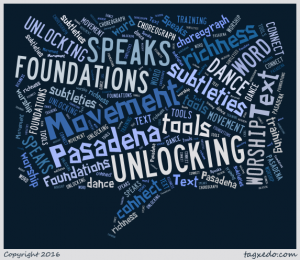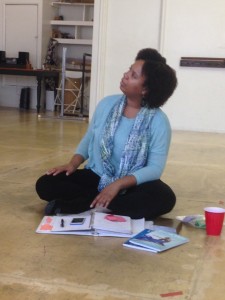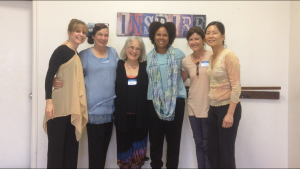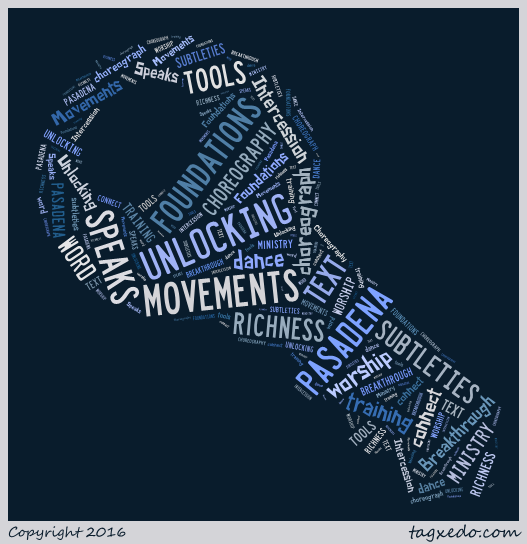When choreographing, should a dance leader look to hear team for inspiration and confirmation about choreography?
Or, does seeking the opinions of others muddy a leader’s connection with God and what He specifically wants to say through her dance?
Does God primarily reveal His Word for the dance through the anointed, appointed leader?
Or, is it important to listen to and gain ideas from a group of Spirit-filled dancers, so that we can more fully understand what God is trying to say?
At the Unlocking Movement that Speaks prophetic movement workshop this past Saturday in Pasadena, these questions simmered among us and left me with some questions for the Lord, “How do you want this done, Lord? How do you speak? How do you want me to best listen?”
At the heart of the discussion were really two paradigms for choreography:
Marlita Hill, my friend and partner who led this workshop, presented this paradigm: God has an assignment specifically for us when we go before the people of God to dance. He has something to say and a way to say it, and the choreographer’s job is to listen to Him, at every stage, for His directions. She emphasized that we do this listening as we converse with the Lord: “Lord, what did you mean when you wrote this in the Psalm or inspired the song writer to use this word?” “Lord, how do you want me to demonstrate this word, phrase, message?” “Lord, I’m thinking this. Is this what you mean?” She affirmed that the Lord will use our unique way of expressing His message. Nonetheless, He has something He wants communicated, a finished work for which I am to receive the instructions and then to assemble.
We may gain ideas and inspiration from others; however, those are always to be subject to the conversation we have with Him. We go to Him and say, “Is this what you meant?” or “Should I say it this way?” We are to be cautious not to let our horizontal conversations with others muddy or replace our vertical communication with Him. We must study the context in which a word is used to better understand the feelings and intent of the One who inspired it be used. All this is to bring a message from the Lord to the people. She made this analogy: If Marlita asks me to deliver a message for her, I don’t gather a group of friends to ask them to interpret the message. I don’t say, “What do you think Marlita meant to say by this?” Instead, I listen carefully to what she says and take that message to the person for whom it was intended.
Participants pushed back on this, pointing out how rich our creativity is when we receive ideas from each other. They said that we better know how to express what God is saying as we collaborate in community to choreograph. One person described a process called, “The community of truth” in which you place a truth out for all to examine and then each person shares what they understand it to mean. In this process, the group collectively gains insight into the depth of the meaning. They emphasized that each individual understands a part of what God is saying and that, together, we can better determine the whole of it. If we look at a scripture or song together and listen to each other, we will express the Lord’s heart and mind more fully.
At the core of the wrestling we did was the question, “How does God speak?” Does He actually speak unmistakably to individuals as common practice? Or, to know His will fully do we need to listen in community? Does He primarily reveal His will (for our dance, in this case) through a group of voices or by instructing His chosen leader? If we are to find an answer that includes both, what guideposts let us know where to put our weight? What is the example that scripture sets for us?
I’ve been asking the Lord these questions as I’ve prayed and read the scriptures this week. And I’m asking you. I suppose, in this process, I’m revealing my natural approach to seeking His will. However, I’m not so interested in what comes naturally to me as what He wants. And I’d like to know what you do and/or what you think. When you share, please share why you do it this way. What scripture or theology has informed your opinion or practice?
To see a video recap of this workshop or to register for our next workshop on April 2, Unlocking Movement for Intercession, click here.


I think that God specifically gives the instructions to the leader. I think it helps cut down on confusion; I think it brings order. I think also that if a group of “minds” gets involved, most of the time you are going to get the individuals different ways of presentation and it takes time away, then it takes trying not to hurt someone’s feelings when their ideal is not exactly a good fit for what the choreographer intended. I suggest if a person wants their ideas to be included, that they should choreograph their own solo…interpret and apply their own creativity….not change the message and choreography that the choreographer have prayed about – and have gotten from God. Biblically illustrated, I believe Miriam got a divine unction and choreography straight from God to her (and all the other day women did not for the same reasons as mentioned above ), and then Miriam lead the people/women into dance and worship. It would have caused confusion, list anointing and or may never have gotten together. It may have been a learned dance, but I believe God gave her the movement and she taught it to the God’s people. I believe when you let others influence you in what God has called you to do, then you can (sometimes) get the confusion and flesh led ideas. Take for instance the dance David offered before the Lord. If he has listened to Michal, what would his choreography have been like? Would it have ever been danced? Would we today have ever realized how “undignified” and unabandoned we can be in our dance and praise? Would the song “Undignified ” ever been written. Like Herod’s stepdaughter presented to Herod at the influence of Herod’s wife on her daughter’s dance. I think God will use the leader’s ideas and creativity, uniqueness, and will help others to follow you as they trust you and pray themselves.
Thank you, Beverly, for sharing this, and for including both practical reasons (it can lead to confusion) and biblical examples and counterexamples. I appreciate both your theology and practical wisdom.
Yes a leader should have the vision and lead. Share the vision and what God has spoken about the message. As others share it is important to keep the main thing, the main thing. God also provides servants to come along side the leaders or as possible future leaders. If they are born again, they have the Holy Spirit residing in them. The same Holy Spirit that leads, guides and teaches every one of us. God can sprinkle the blessings of different choreography here and there through different people at different times as opportunities arise that speak to them personally. Hebrews 10:25 speaks about assembling together and exhorting one another. We gain strength and growth as we glean from one another. Obviously you want to seek out those qualified by good reputation and filled with the Holy Spirit and wisdom as they did in Acts 6:3.
At the time when Jesus was in the temple healing the lame and blind, and God’s children were crying out “Hosanna to the Son of David!” the chief priest and scribes were indignant. Jesus responds with “Out of the mouth of babes and nursing infants, You have perfected praise”. Matthew 21:14 – 16 “This also reminds me of Psalm 8:2 Out of the mouth of babes and nursing infants You have ordained strength, because of Your enemies, that You may silence the enemy and the avenger.”
God is creative so His children can also be creative. Some don’t know it or haven’t developed it yet and others are so full, they want to pour it out. A good leader will discern by the power of the Holy Spirit when best to stay firm or be flexible with the choreography that God has given them to proceed with. Sometimes a slight adjustment can mean a direct hit to speak to the heart and/or spirit of the on lookers, breaking their bondage, bring healing, restoration or encouragement.
Sometimes as a leader we may be stuck or just not feeling confident with what we have. God gives us those opportunities to remind us we cannot do it all alone. He didn’t design us to be our own individual islands. Giving out just a portion of the presentation to someone that may be strong in that part, can also bring more to the message. This can also stir more creativity within a team. When a person is continually not allowed to use what God is giving them, they can become spiritually dormant. When we use what God is giving us, we set an atmosphere for creativity and growth.
Thank you so much for responding, Suzi. Beautifully said.